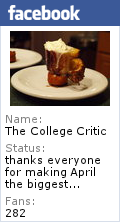Wednesday, Josh Ozersky tweeted: “The next time you think we’ve how far we’ve come read this:http://www.slate.com/id/2256610/ And Slate wasn’t ashamed to run it! 2:53 PM Jun 16th via web” (I’ve made the link active for your convenience.)
Reading this tweet, I immediately considered what heinous content Slate might have published. An advocacy of factory farms perhaps? A polemic against sustainable fishing? Praise for high fructose corn syrup, dangerous food additives, fast food, obesity, and all that “foodies” (I hate that word) consider wrong with America? To misquote King Lear, No, no, no, no, no, and no. Slate‘s article, “Shoe-Leather Reporting,” explains the “history of well-done meat in America.”
I’m not trying to pick a fight. 1) Josh Ozersky’s website, ozersky.tv, offers super high quality and super entertaining videos that probe unseen aspects of New York’s food scene. In fact, I immensely enjoy watching these superbly produced clips. 2) I almost always eat my meat medium-rare.
Nevertheless, I think that Ozersky’s tweet represents a pervasive trend in the food industry, specifically the elite, journalistic factions of that industry. A tendency towards self-righteousness and normativity infects the literature: thou shallt eat that this way, thou shallt not eat that. Oftentimes, these didactic positions appear to provide helpful instruction, especially regarding questions of ethics like sustainability and small farms. When didacticism devolves into mere posturing and rhetoric, and when it concerns meaningless matters of personal choice, the bitter tastes of know-it-allism and elitist self-righteousness emerge. The vegetarian who looks judgmentally on an omnivorous friend. The meat eater who scoffs at the veggie-burger.
Even on ethical issues, such normative claims never represent a definitive truth value. Virtually anything once thought true can, under the right conditions, be demonstrated false (Calum Matheson said something similar in the documentary Debate Team.) Persuasive arguments exist against community-supported agriculture, vegetarianism, omnivorism, and even sustainability. (I will note that some of these “persuasive arguments” involve a certain logical jujitsu. Many are along the lines of–X prevents us from actually transitioning away from post-industrial capitalism, etc.)
Ozersky portrays Susan Burton’s article as backwards, offensive, and shameful, presumably because he reads “Shoe-Leather Reporting” as directly and explicitly in favor of eating well-done meat. In reality, Burton never articulates that others should eat gray steaks and mealy hamburgers (forgive my implicit normativity). Instead, she simply traces the development of blood-lust in American dining in the 20th century, arguing that the temperature standards for “rare” have crept progressively cooler. At the article’s conclusion, she even tries medium-rare steak. Arriving at her table:
It was black and crusty on the outside and in the middle, dark red. It had been cut into thin slices, which was reassuring. There would be no mystery center—a raw shocker halfway through my meal. I wouldn’t have to worry that the kitchen hadn’t realized the inside was still bloody; a professional had evaluated this meat, decided it was OK like that. Normally I would have started with the most well-done strip, but this time I went right for the red. I tasted it, and it was: good.
Of course, Burton finds that the meat:
was tender. It was juicy. But here’s the catch: I didn’t revel in its merits. And this confirmed what I had suspected: that these aren’t necessarily qualities I prize in food. When people say “juicy,” I think of Starburst TV commercials from the 1980s—an artificially flavored explosion in my mouth. I was reminded of an observation I’d come across online: People who prefer well-done don’t regard the lack of juiciness as a problem. They like dried things. Liking dried things: Yes, this was me. It was a motif, a style, an inclination for the arid: for raisins, for the air in Colorado, for floorboards without the high-gloss sheen. My spirits fell a little. Is this who I am, a lover of the desiccated? I poked around with my fork, and my heart lifted at discovering something blackened: the onions. Delicious. Then I cut a bite of a savory, well-cooked end strip. “See, this is so good,” I said, sighing. It was disappointing to admit it. “This is what I like.”
Ultimately, Burton advocates for personal taste and individual choice. Eat what you like, what tastes good to you, what settles well on your conscience and doesn’t weigh you down. In the case of well-done meat, make informed decisions about food safety, the ethics surrounding the chosen protein, and even what a consensus of food experts deems the absolute pinnacle of sensory satisfaction. Then, eat what you like, within reason, without regrets.
After perusing Burton’s article, I think that Slate ought to feel proud of publishing such a measured and objective piece. Validating the power of individual choice seems paramount in the rapidly changing culinary world. With multitudes of diners offering opinions on websites like Yelp and Chowhound, the importance of not blindly following the crowd appears all the more evident. I like my meat medium-rare, nicely pink and crusty on the exterior; that’s how my dad grilled Porterhouse steaks, and I love the sensation of mildly warmed, velvety soft beef. Susan Burton likes hers desiccated. Josh Ozersky does not. Taste, a mysterious and poorly understood process, cannot be categorized and reduced to “what tastes good” and “what tastes bad,” especially in the context of “thou shallt eat this not that.” Statements like that come across as overcooked.


And yet you made fun of me for ordering my burger medium yesterday… At least I didn’t order a burger in the shape of a sub. :-)
dude, way to reveal my extreme (and private) hypocrisy. and how else do you fit a burger on garlic bread. answer me that.